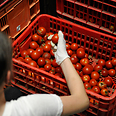
Israelis throw out 40% of their food
One of reasons for famine is that consumers buy more food than they actually consume. Environmental Protection Ministry estimates Israeli household discards edible food worth NIS 350 a month
World Food Day was set by the Food and Agriculture Organization of the United Nations in a bid to raise awareness to hunger and poverty worldwide. While in the past the danger of famine in the Western world appeared to be far away, with the combination of environmental degradation and the excessive consumerism culture it is now right around the corner.
Naama Ashur, director of the Solid Waste Division at the Ministry of Environmental Protection, says ministry figures show that 40-50% of garbage in Israel is comprised of food and many parts of it are edible.
"The expiration date noted on products is too early as well," she says. The Environmental Protection Ministry is incapable of changing the expiration date on food products, and so it focuses instead on educating the public to practice green and wise consumerism – or in other words, buy less and only what you need.
"While we fight for a reduction of the cost of living, it turns out that the use of food products in Israel is unsupervised, and in many cases there is excess consumption," says Environmental Protection Minister Amir Peretz.
"The cheapest and healthiest food is the food we haven't consumed. Consumers should buy according to a list prepared in advance, not according to the campaign they saw the day before. That way they will be doing a better job protecting their family's health, their environment and their pocket."
30-40% of food lost in production process
The excess consumption has serious environmental consequences. The increased industrial production of food leads to a higher emission of greenhouse gases to the atmosphere as part of production processes.
The energetic waste is not just on the consumer's side, but also on the side of food manufacturers. According to a new study by the Deshe Institute and the Agricultural Ministry presented recently at the annual conference of Israel Society of Ecology & Environmental Sciences, the rate of land degradation in Israel puts the agricultural industry in danger – and as a result, the production of food as well.
Ninety-one percent of agricultural lands are in danger of degradation. In other words, the absolute majority of manufactured agricultural products are in danger and do not mature into products in the end, mostly due to weather perils.
According to Dr. Amnon Lichter of the Department of Postharvest Science at the Volcani Center, "Figures today show that some 30-40% of food gets lost. From this figure it can be derived that there is a loss of 3.3 gigaton of carbon dioxide and 14 billion dunams (3.5 billion acres) of tilled agricultural land.
"Every year there is global agricultural production of 6.6 gigaton. According to these figures, there is a loss of some 1.3 gigaton of agricultural produce."
"The growth and production of food is based on basic natural resources like water, land, air and energy. Because there is a shortage of all these resources, food is also a resource in shortage," says Prof. Adi Wolfson of the Green Processes Center at the Shamoon College of Engineering.
"Add to that the extreme climate changes observed throughout the world in recent years alongside the pollution of lands and sources of water on the one hand, and the wasteful consumption culture of the modern society and the pollution involved in the production of food on the other hand, and you'll see that the world's food production ability is decreasing and food prices are only expected to go up."










